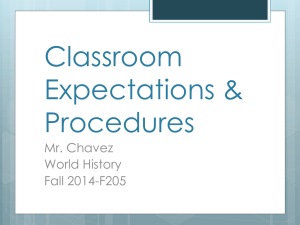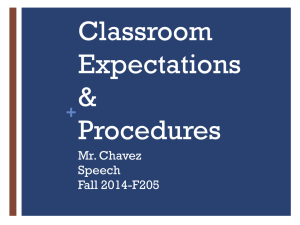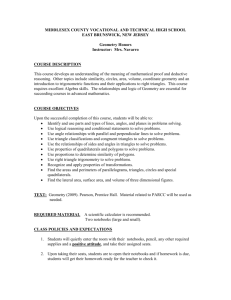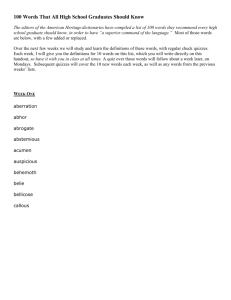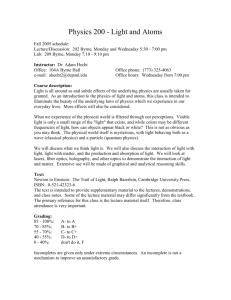Spring 2014 NEUR 101 Syllabus
advertisement
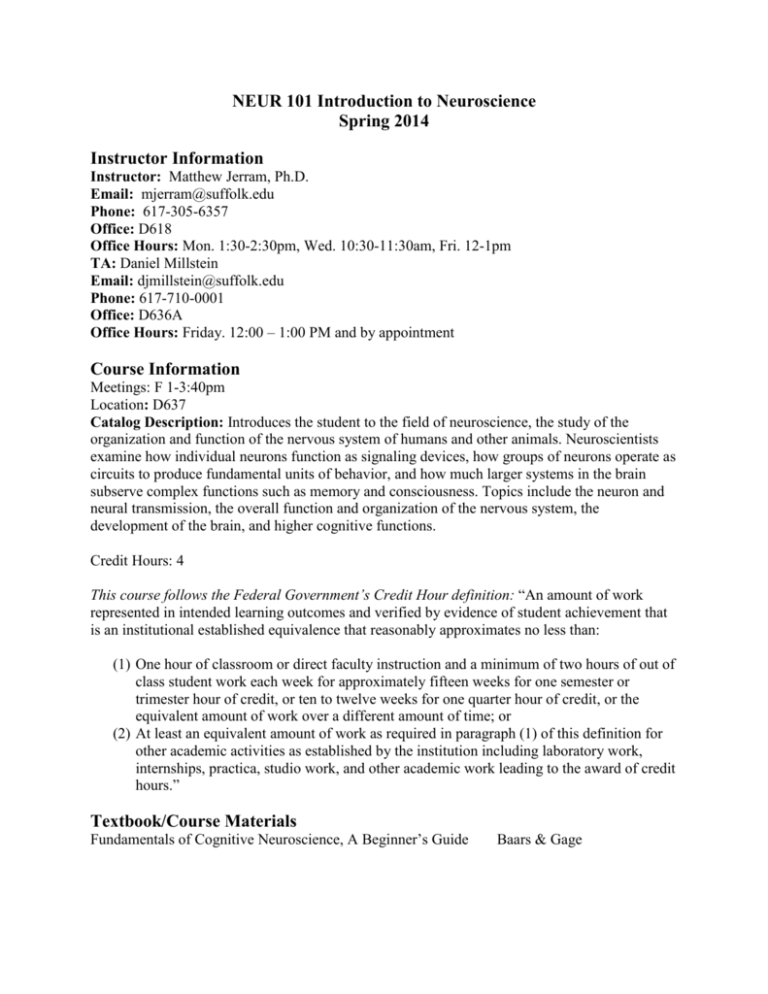
NEUR 101 Introduction to Neuroscience Spring 2014 Instructor Information Instructor: Matthew Jerram, Ph.D. Email: mjerram@suffolk.edu Phone: 617-305-6357 Office: D618 Office Hours: Mon. 1:30-2:30pm, Wed. 10:30-11:30am, Fri. 12-1pm TA: Daniel Millstein Email: djmillstein@suffolk.edu Phone: 617-710-0001 Office: D636A Office Hours: Friday. 12:00 – 1:00 PM and by appointment Course Information Meetings: F 1-3:40pm Location: D637 Catalog Description: Introduces the student to the field of neuroscience, the study of the organization and function of the nervous system of humans and other animals. Neuroscientists examine how individual neurons function as signaling devices, how groups of neurons operate as circuits to produce fundamental units of behavior, and how much larger systems in the brain subserve complex functions such as memory and consciousness. Topics include the neuron and neural transmission, the overall function and organization of the nervous system, the development of the brain, and higher cognitive functions. Credit Hours: 4 This course follows the Federal Government’s Credit Hour definition: “An amount of work represented in intended learning outcomes and verified by evidence of student achievement that is an institutional established equivalence that reasonably approximates no less than: (1) One hour of classroom or direct faculty instruction and a minimum of two hours of out of class student work each week for approximately fifteen weeks for one semester or trimester hour of credit, or ten to twelve weeks for one quarter hour of credit, or the equivalent amount of work over a different amount of time; or (2) At least an equivalent amount of work as required in paragraph (1) of this definition for other academic activities as established by the institution including laboratory work, internships, practica, studio work, and other academic work leading to the award of credit hours.” Textbook/Course Materials Fundamentals of Cognitive Neuroscience, A Beginner’s Guide Baars & Gage Course Goals & Learning Objectives GOALS Upon successful completion of this course, students will: Understand the scientific method and how it applies to the study of the nervous system Know the basic structure of the nervous system Understand the general concept of the field of cognitive psychology Understand the relationships between cognitive functions and the brain OBJECTIVES Upon successful completion of this course, students will be able to: Describe the components of the scientific method and evaluate their use in the study of the nervous system Identify the central and peripheral nervous system and their components Describe the behaviors that fall into cognitive psychology, such as attention, memory, language, executive functions, etc. Describe how research is used to better understand cognitive functions Describe the research methods used to describe these relationships Describe current knowledge about these relationships Critically evaluate evidence used to draw conclusions about these relationships ASSESSMENTS How the student will be assessed on these learning objectives: Reaction papers, online quizzes, final exam, in class discussions Online quizzes, final exam Online quizzes, final exam, reaction papers, in class discussions Reaction papers, in class discussions Reaction papers, in class discussions Online quizzes, final exam, reaction papers, in class discussions Reaction papers, in class discussions Assignments/Exams/Papers/Projects The course will require weekly reading, a final exam, 5 online quizzes, 5 300-500 word reaction papers and participation of each student in weekly in class discussions. It is expected that students will read the readings assigned for each class. Readings will consist of a chapter from the assigned text AND other articles and readings that pertain to the topic of the week. Readings outside the textbook will be posted on Blackboard. These readings are intended to generate discussion in class regarding the methods used and the conclusions drawn by researchers. They will also form the basis of the reaction papers. Students are expected to come to class prepared to ask questions about the reading and/or discuss their opinion of the material presented in the reading. It is advisable to take notes on the chapters and to bring questions from your reading to class. While lectures will generally parallel the readings, they will not overlap completely and lecture is not a sufficient substitute for the reading. Exam questions may be drawn from the reading even if the topic was not explicitly covered in lecture. A final exam will be given at the end of the semester. It will be cumulative and will constitute 25% of the total grade. Students will be required to complete 5 online quizzes. These quizzes are intended to help students assimilate the large amount of new information, particularly vocabulary, required for this course. Each quiz will be posted on the course’s Blackboard site Friday and will remain available until 5pm the following Wednesday. There will be 5 quizzes in all; there will be quizzes due on Feb. 5, Feb. 19, Mar. 5, Apr. 2 and Apr. 23. Each quiz will be worth 6% of the total grade (30% for all five quizzes). Students will also be required to complete 5 reaction papers during the semester; these papers will ask students to respond to a question about a specific neuroscience reading posted on Blackboard. The paper is expected to be about 1-2 pages (300-500 words double-spaced). Each paper is an opportunity for students to discuss neuroscience research findings in the context of understanding the scientific method. A written description of the structure of these papers will be provided in class and posted on Blackboard. Each paper will be assigned on Friday and must be submitted to the instructor electronically before class begins the following week. There will be 5 papers in all; there will be papers due Jan. 31, Feb. 14, Feb. 28, Mar. 28 and Apr. 11. Each paper will be worth 6% of the total grade (30% for all five papers). Class participation will be determined on class attendance and the active participation of each student. All students are expected to come to class having read the assigned reading and prepared to answer questions, offer opinions or discuss implications. Class participation will constitute 15% of the final grade. Coursework will be weighted as follows: Quizzes Reaction Papers Final Exam Class Participation 30% 30% 25% 15% Grading/Evaluation Grades will be assigned on the basis of the completeness and correctness of quizzes, papers, and the final exam, as well as the observed participation of the student in class. There will not be an opportunity to make up missed work if a student misses an exam for any reason. Students must complete each quiz by the assigned Wednesday at 5pm. Each week’s quiz will focus on information from the readings from the previous two weeks; please do not assume that all information in the quiz will be covered during lectures. Students are expected to work on quizzes alone; indications of working together will be result in students getting no credit for the quiz. Quizzes that are late will not be accepted and will result in no credit for the assignment. Students who report problems with Blackboard after Wednesday at noon will not have an opportunity to make up a quiz. The papers are due by 1pm on the due dates listed above. Papers must be submitted electronically to the instructor’s email (mjerram@suffolk.edu) in .doc format (Word format) and must be doublespaced in 12-point font – there will be no exceptions to this policy and papers submitted without the correct formatting will not be graded. Late papers will not be accepted and will result in no credit for the assignment. Students are expected to work independently on the paper and indications of collaboration will result in no credit for the assignment. In addition to addressing the question for each paper, spelling, grammar and style will be considered in grading. If you have any questions about any of the assignments, please ask prior to the assignment’s due date; a lack of understanding the assignment will not extend the due date. Please be aware that Suffolk University’s academic policy states the following about grades: “A,” “A –,” “B+,” and “B” are honor grades. “B –,” “C+,” and “C” represent satisfactory work. “C –,” “D+,” “D,” and “D –” represent passing but unsatisfactory work. “F” is a failing grade. Therefore, a grade between C and B- means that your work is satisfactory, not deficient. Grades above B- are for work that is above what is expected. Grades are determined by percentage of points attained. In general, this means that the following ranges represent the following grades: 100-95% A 90-94% A86-89% B+ 82-85% B 79-81% B75-78% C+ 70-74% C 66-69% C63-65% D+ 60-62% D 56-59% D<55% F Course Policies Participation/Attendance Policy Because of the complexity of the topic, attendance and in-class participation will also be considered in the final grade. In-class participation includes remaining attentive in class and will be adversely affected by activities such as texting. In fact, it is required that all cell phones, PDAs and other personal electronic devices be turned off at the beginning of each class. Students found attending to a personal electronic device during class will be asked to leave the class for the day. As required by the University, attendance will be taken at each class meeting. It is expected that students will attend all class sessions and will arrive for class on time. If you will be absent, please contact the instructor as soon as possible. Three unexcused absences through the semester will result in a grade reduction of one-third (i.e., B to B-); every subsequent absence will result in a further one-third reduction. While it is understandable that occasionally one will be late, please consider your instructor and fellow students and make every effort to be in class on time. Late arrivers are very disruptive. In the event that the university cancels classes, such as for severe weather, students are expected to continue with readings as originally scheduled. Any assignments scheduled during those missed classes, such as a quiz or paper, are due on the assigned date unless other instructions are posted at the course website or communicated via email. Communicating with the Instructor Because neuroscience is a complex topic requiring substantial attention, it is imperative that you pay attention to your performance in class and approach the instructor if you find yourself struggling. Asking questions in class is an excellent way to address gaps in knowledge, particularly because it is likely that multiple people are struggling similarly. You may also approach the instructor during office hours. If you need to communicate with the instructor, you will find the most success coming to office hours, followed by using email – phone calls will be the least successful way to reach the instructor. If you receive notification of an Early Alert, which go out around the 5th or 6th week of the semester, you NEED to seek additional help. This Alert is designed to indicate problems that are predictive of not completing the course successfully. Additionally, every student MUST use their Suffolk email account and have access to the Blackboard system. Class announcements will be sent through Suffolk email and all quizzes and reaction paper readings will be available ONLY through Blackboard. If you have any difficulty with either your email account or Blackboard access, visit the Help Desk in the Sawyer building. Statement on Physical/Emotional Health A range of issues can cause barriers to learning, such as strained relationships, increased anxiety, health issues, alcohol/drug problems, feeling down, difficulty concentrating, lack of motivation or feeling ill. These concerns or other stressful events may lead to diminished academic performance or may reduce your ability to participate in daily activities. University resources can help you address these and other concerns. You can learn more about Suffolk’s broad range of medical and confidential mental health services at www.suffolk.edu/health Statement on Accommodations for Students with Disabilities If you anticipate issues with the format or requirements of this course, please meet with me—I would like to discuss ways to ensure your full participation in my classroom. If you determine that you need formal, disability-related accommodations, it is very important that you register with the Office of Disability Services (located at 73 Tremont Street, 7th floor, 617.994.6820, disabilityservices@suffolk.edu) and notify me of your eligibility for reasonable accommodations. We can then plan how best to implement your accommodations. The Early Alert Project This class participates in Suffolk’s Early Alert Project. Around week 6, I will notify the Center for Learning and Academic Success (CLAS), if you have struggled with writing or language skills, excessive absences, incomplete work, or difficulty with the course content. This warning is not an official grade, yet it indicates concerns about your progress that need to be addressed immediately. If you receive an Early Alert, please visit me during my office hours so we may talk about strategies for how you can be successful in this class. The Center for Learning and Academic Success (CLAS) offers academic coaching and tutoring in math, writing and English, and many other CAS and SBS courses. Students may join study groups, participate in drop-in services, or make appointments with tutors and academic coaches to reinforce course content, develop writing, and strengthen effective study habits. For a complete review of free services, workshops and online resources go to www.suffolk.edu/CLAS, call 617.573.8235, email clas@suffolk.edu or visit CLAS on the 2nd Level of Sawyer Library at 73 Tremont Street. Statement for International Students International Student Services Office (ISSO), a part of the Center for International Programs and Services, provides comprehensive support to international students regarding immigration status and DHS regulatory responsibilities. If you are an international student in F-1 or J-1 status, you are responsible to maintain full-time enrollment (minimum of 12 units) every semester, else your immigration status is at risk. For more information, go to http://www.suffolk.edu/isso, call 617.573.8154, email isso@suffolk.edu or visit ISSO on the 6th floor of 73 Tremont. Statement on Technology Services Suffolk University provides a variety of resources to support course technology: University Help Desk (Mon-Fri, 8:30am – 8pm): 617.557.2000 or helpdesk@suffolk.edu For Blackboard and Collaborate assistance, please contact the 24-hour support line at 866.886.4861. Step-by-step Blackboard tutorials are accessible within every Blackboard course via the Bb Tutorials menu On Demand Knowledge Base provides information on all other technologies that are used in courses, including teaching, learning, research and productivity tools Course Withdrawal Deadlines February 11, 2014 is the last day students can withdraw from a course without receiving a grade of W. The course will be completely removed from the student's transcript. Students may do this online via MySuffolk. March 20, 2014 is the last day students can withdraw from a course without receiving a grade of F. They will receive a W on their transcript instead. Students may do this online via MySuffolk. After March 20, 2014, students may not withdraw from courses unless they have serious extenuating circumstances and documentation. Students should contact the Student Affairs Office (located at 73 Tremont Street, 12th floor, 617.573-8230, studentaffairs@suffolk.edu) to learn more about requesting a late course withdrawal. Academic Integrity Policy Cheating on examinations or quizzes, plagiarism and/or improper acknowledgment of sources in essays or research papers, and the use of a single essay or paper in more than one course, without the permission of the instructor, constitute unacceptable academic conduct. Student work may be checked by plagiarism detection software. Academic dishonesty will be reported to the Office of Student Affairs. Reports will be addressed through the Student Discipline System. An undergraduate student who has been found to have violated this policy is subject to an automatic grade of “F” in the course and to suspension, enforced withdrawal, or dismissal from the University or appropriate lesser penalties if warranted by the circumstances. To be sure that all are aware of the University’s policy on academic honesty, I have provided it here: UNDERGRADUATE ACADEMIC HONESTY POLICY Cheating on examinations, plagiarism, improper acknowledgement of sources in essays or research papers, and/or the use of a single essay or paper in more than one course without the permission of the instructor constitute unacceptable academic conduct. It is dishonest to buy, sell, download, borrow, or lend papers. It is unacceptable to make up or falsify data that are supposed to be collected from survey, experimentation, or other means. Work that is represented as yours should be your own; if not, the source should be properly identified. This applies to lab reports, computer projects, and group projects as well as to individual assignments. Each instructor should fully explain the requirements of the course and the applicable policies regarding academic dishonesty. Students alleged to have violated this policy will be referred to the dean of students, or designee, and are subject to sanctions including a 0 on the assignment, grade of F in the course, suspension, enforced withdrawal from the course, or dismissal from the University or appropriate lesser penalties if warranted by the circumstances. Course Schedule The schedule, policies, procedures, and assignments in this course are subject to change in the event of extenuating circumstances, by mutual agreement, and/or to ensure better student learning. Week (with Date) 1 Jan. 17 2 Jan. 24 3 Jan. 31 4 Feb. 7 5 Feb. 14 6 Feb. 21 7 Feb. 28 8 Mar. 7 9 Mar. 14 10 Mar. 21 11 Mar. 28 12 Apr. 4 13 Apr. 11 14 Apr. 18 General Topic Introduction and Discussion of Scientific Method The Neuron The Brain Development Sex and Social Neuroscience Sight Sound and Music Language Ethanol’s Effect on Brain Function (SPRING BREAK) Consciousness and Sleep Learning and Memory Thinking and Decision Making NO CLASS Affective Neuroscience Final Exam Date & Time Reading Assignment Ch. 1 Chapters 2,3 Chapters 4,5 Chapter 14 Chapter 13, Purves et al reading (Blackboard) Chapter 6 Chapter 7 Chapter 11 Chapter 8 Chapter 9 Chapters 10, 12 Blackboard readings MON., Apr. 28, 1:00-2:50pm Assignment PAPER DUE QUIZ DUE (2/5) PAPER DUE QUIZ DUE (2/19) PAPER DUE QUIZ DUE (3/5) PAPER DUE QUIZ DUE (4/2) PAPER DUE QUIZ DUE (4/23)

